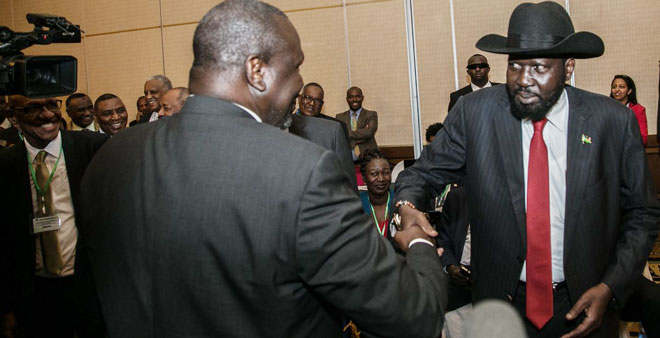
South Sudan foes agree to withdraw forces from ‘urban areas’
Khartoum, Sudan | AFP | South Sudan’s government and rebels agreed Friday to withdraw troops from urban areas, a Sudanese official said, as they signed a deal aimed at ending a four-and-a-half year civil war.
The deal comes a day before the South Sudan and Sudan leaders travel to Entebbe, Uganda to meet President Yoweri Museveni to consolidate the recent agreements.
“All parties have agreed to withdraw military troops from urban areas as part of the security agreement,” Sudanese chief of military intelligence Jamal Omar said at the signing ceremony in Khartoum.
The agreement comes days after South Sudanese arch-foes President Salva Kiir and rebel leader Riek Machar agreed on a permanent ceasefire, raising hopes of an end to the conflict in the world’s youngest country.
Friday’s deal in the latest round of peace talks hosted by neighbouring Sudan was signed at Sudan’s defence ministry and attended by Machar, South Sudanese officials and journalists.
Omar said a security committee would also be set up to monitor the implementation of the deal.
Two years after separating from Sudan in 2011, oil-rich South Sudan plunged into a war that has killed tens of thousands of people and displaced four million, after Kiir accused his then-deputy Machar of plotting a coup.
After several previous peace efforts failed, regional East African leaders launched a new bid last month to end the war as the two warring factions face likely UN sanctions.
The rivals agreed a permanent ceasefire across South Sudan on June 27.
Kiir and Machar signed the ceasefire document — called the “Khartoum Declaration” — in the presence of Sudanese President Omar al-Bashir.
Although the rebels accused the South Sudanese army of breaking the ceasefire just hours after it came into force, sources say it has largely been observed, with no reports of fighting or clashes over the past four days.
The conflict in South Sudan erupted in December 2013, dashing the optimism that had accompanied independence from Sudan.
The war, fuelled by the deep enmity between Kiir and Machar, spread to several states and was characterised by ethnic massacres, attacks on civilians, widespread rape, the recruitment of child soldiers and other human rights violations.
 The Independent Uganda: You get the Truth we Pay the Price
The Independent Uganda: You get the Truth we Pay the Price





